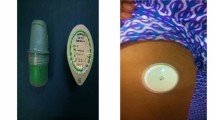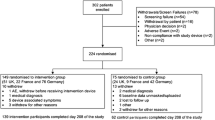Abstract
Purpose
Studies of flash glucose monitoring systems (FGMSs) in pregnancy are insufficient, especially in gestational diabetes (GD). Our aim was to evaluate Freestyle Libre’s usability and accuracy (compared to self-monitoring of blood glucose [SMBG]) for GD patients in real-life conditions.
Methods
This is a prospective study with pregnant women diagnosed with GD (n = 24 for the usability analysis; n = 19 for the accuracy analysis). The study duration was up to 28 days (lifetime of two sensors). Participants executed a minimum of four daily FGMS readings obtained immediately after capillary SMBG. Analytical accuracy was assessed with mean absolute relative difference (MARD) and mean absolute difference (MAD); clinical accuracy was assessed with Surveillance Error Grid (SEG). Usability was evaluated with a user acceptability questionnaire.
Results
The mean pregestational BMI was 25.21 ± 5.15 kg/m2 (mean ± SD), the mean gestational age was 30.31 ± 2.02 weeks, and the mean glucose values were 76.63 ± 7.49 mg/dL. A total of 1339 SMBG–FGMS pairs of values were obtained. Analytical accuracy was good with an overall MARD of 14.07% and an in-target MARD of 13.79%. The number of SMBG–FMGS pairs for above-target values was low (122 of 1339) with an associated MARD of 17.95%. Clinical accuracy of the FGMS was demonstrated, with 94.4% of values in the no-risk or slight, lower risk zones of the SEG. FGMS accuracy was unaffected by pregestational BMI or gestational age. The user acceptability questionnaire showed high levels of satisfaction, with 95.8–100% preferring FGMS to SMBG. No unexpected or severe adverse effects occurred.
Conclusion
FGMS showed good performance in GD regarding accuracy and usability. Larger studies are needed to corroborate our results, verify the analytical accuracy of above-target values as this glucose range might lead to initiation or adjustment of pharmacological therapy, and ultimately establish definitive recommendations regarding prescription of FGMS for GD patients.



Similar content being viewed by others
References
American Diabetes Association Professional Practice Committee, American Diabetes Association Professional Practice Committee, Draznin B, Aroda VR, Bakris G, Benson G, Brown FM, Freeman R, Green J, Huang E, Isaacs D, Kahan S, Leon J, Lyons SK, Peters AL, Prahalad P, JEB R, Young-Hyman D, Das S, Kosiborod M (2022) 15. Management of diabetes in pregnancy: standards of medical care in diabetes-2022. Diabetes Care 45(Suppl 1):S232–S243. https://doi.org/10.2337/dc22-S015
(2014) Diagnostic criteria and classification of hyperglycaemia first detected in pregnancy: a World Health Organization Guideline. Diabetes Res Clin Pract 103(3):341-63. https://doi.org/10.1016/j.diabres.2013.10.012
HAPO Study Cooperative Research Group, Metzger BE, Lowe LP, Dyer AR, Trimble ER, Chaovarindr U, Coustan DR, Hadden DR, McCance DR, Hod M, McIntyre HD, Oats JJ, Persson B, Rogers MS, Sacks DA (2008) Hyperglycemia and adverse pregnancy outcomes. N Engl J Med 358(19):1991–2002. https://doi.org/10.1056/NEJMoa0707943
Yu F, Lv L, Liang Z, Wang Y, Wen J, Lin X, Zhou Y, Mai C, Niu J (2014) Continuous glucose monitoring effects on maternal glycemic control and pregnancy outcomes in patients with gestational diabetes mellitus: a prospective cohort study. J Clin Endocrinol Metab 99(12):4674–4682. https://doi.org/10.1210/jc.2013-4332
Reece EA (2010) The fetal and maternal consequences of gestational diabetes mellitus. J Matern Fetal Neonatal Med 23(3):199–203. https://doi.org/10.3109/14767050903550659
Crowther CA, Hiller JE, Moss JR, McPhee AJ, Jeffries WS, Robinson JS; Australian Carbohydrate Intolerance Study in Pregnant Women (ACHOIS) Trial Group (2005)Effect of treatment of gestational diabetes mellitus on pregnancy outcomes. N Engl J Med. 16;352(24):2477-2486. https://doi.org/10.1056/NEJMoa042973
Hod M, Simeoni U (2009) Maternal, fetal and neonatal complications of diabetic pregnancy-delivering optimal care while awaiting for cure. Semin Fetal Neonatal Med 14(2):63–65. https://doi.org/10.1016/j.siny.2008.09.003
Dani C, Bresci C, Berti E, Ottanelli S, Mello G, Mecacci F, Breschi R, Hu X, Tenori L, Luchinat C (2014) Metabolomic profile of term infants of gestational diabetic mothers. J Matern Fetal Neonatal Med 27(6):537–542. https://doi.org/10.3109/14767058.2013.823941
Freire CM, Barbosa FB, de Almeida MC, Miranda PA, Barbosa MM, Nogueira AI, Guimarães MM, Nunes Mdo C, Ribeiro-Oliveira A Jr (2012) Previous gestational diabetes is independently associated with increased carotid intima-media thickness, similarly to metabolic syndrome-a case control study. Cardiovasc Diabetol 31(11):59. https://doi.org/10.1186/1475-2840-11-59
McIntyre HD, Catalano P, Zhang C, Desoye G, Mathiesen ER, Damm P (2019) Gestational diabetes mellitus. Nat Rev Dis Primers 11;5(1):47. https://doi.org/10.1038/s41572-019-0098-8
Carreiro MP, Nogueira AI, Ribeiro-Oliveira A (2018) Controversies and advances in gestational diabetes-an update in the era of continuous glucose monitoring. J Clin Med. 25 7(2):11. https://doi.org/10.3390/jcm7020011
Almeida M do C, Dores J, Ruas L (2017) Consenso “Diabetes Gestacional”: Atualização 2017. Rev Port Diabetes 12(1):24–38.
National Collaborating Centre for Women’s and Children’s Health (UK) (2015) Diabetes in pregnancy: management of diabetes and its complications from preconception to the postnatal period. London: National Institute for Health and Care Excellence (UK)
Scott EM, Bilous RW, Kautzky-Willer A (2018) Accuracy, user acceptability, and safety evaluation for the FreeStyle Libre flash glucose monitoring system when used by pregnant women with diabetes. Diabetes Technol Ther 20(3):180–188. https://doi.org/10.1089/dia.2017.0386
Bühling KJ, Winkel T, Wolf C, Kurzidim B, Mahmoudi M, Wohlfarth K, Wäscher C, Schink T, Dudenhausen JW (2005) Optimal timing for postprandial glucose measurement in pregnant women with diabetes and a non-diabetic pregnant population evaluated by the Continuous Glucose Monitoring System (CGMS). J Perinat Med 33(2):125–131. https://doi.org/10.1515/JPM.2005.024
Kestilä KK, Ekblad UU, Rönnemaa T (2007) Continuous glucose monitoring versus self-monitoring of blood glucose in the treatment of gestational diabetes mellitus. Diabetes Res Clin Pract 77(2):174–179. https://doi.org/10.1016/j.diabres.2006.12.012
Cypryk K, Pertyńska-Marczewska M, Szymczak W, Wilcyński J, Lewiński A (2006) Evaluation of metabolic control in women with gestational diabetes mellitus by the continuous glucose monitoring system: a pilot study. Endocr Pract 12(3):245–250. https://doi.org/10.4158/EP.12.3.245
Chen R, Yogev Y, Ben-Haroush A, Jovanovic L, Hod M, Phillip M (2003) Continuous glucose monitoring for the evaluation and improved control of gestational diabetes mellitus. J Matern Fetal Neonatal Med 14(4):256–260. https://doi.org/10.1080/jmf.14.4.256.260
Hui AL, Sevenhuysen G, Harvey D, Salamon E (2014) Barriers and coping strategies of women with gestational diabetes to follow dietary advice. Women Birth 27(4):292–297. https://doi.org/10.1016/j.wombi.2014.07.001
Wei Q, Sun Z, Yang Y, Yu H, Ding H, Wang S (2016) Effect of a CGMS and SMBG on maternal and neonatal outcomes in gestational diabetes mellitus: a randomized controlled trial. Sci Rep 27(6):19920. https://doi.org/10.1038/srep19920
Oskarsson P, Antuna R, Geelhoed-Duijvestijn P, Krӧger J, Weitgasser R, Bolinder J (2018) Impact of flash glucose monitoring on hypoglycaemia in adults with type 1 diabetes managed with multiple daily injection therapy: a pre-specified subgroup analysis of the IMPACT randomised controlled trial. Diabetologia 61(3):539–550. https://doi.org/10.1007/s00125-017-4527-5
Haak T, Hanaire H, Ajjan R, Hermanns N, Riveline JP, Rayman G (2017) Flash glucose-sensing technology as a replacement for blood glucose monitoring for the management of insulin-treated type 2 diabetes: a multicenter, open-label randomized controlled trial. Diabetes Ther 8(1):55–73. https://doi.org/10.1007/s13300-016-0223-6
Bolinder J, Antuna R, Geelhoed-Duijvestijn P, Kröger J, Weitgasser R (2016) Novel glucose-sensing technology and hypoglycaemia in type 1 diabetes: a multicentre, non-masked, randomised controlled trial. Lancet 5;388(10057):2254-2263. https://doi.org/10.1016/S0140-6736(16)31535-5
Feig DS, Asztalos E, Corcoy R, De Leiva A, Donovan L, Hod M, Jovanovic L, Keely E, Kollman C, McManus R, Murphy K, Ruedy K, Sanchez JJ, Tomlinson G, Murphy HR, CONCEPTT Collaborative Group (2016) CONCEPTT: continuous glucose monitoring in women with type 1 diabetes in pregnancy trial: a multi-center, multi-national, randomized controlled trial-study protocol. BMC Pregnancy Childbirth. 18 16(1):167. https://doi.org/10.1186/s12884-016-0961-5
Secher AL, Madsen AB, Ringholm L, Barfred C, Stage E, Andersen HU, Damm P, Mathiesen ER (2012) Patient satisfaction and barriers to initiating real-time continuous glucose monitoring in early pregnancy in women with diabetes. Diabet Med 29(2):272–277. https://doi.org/10.1111/j.1464-5491.2011.03426.x
Abbott Laboratories S.A (2017) Abbott diabetes care: freestyle Libre user’s manual. Abbott
Cardoso H, Carvalho D, Pape E et al (2018) Consenso Nacional para a Utilização do Sistema de Monitorização Flash da Glicose National Consensus on the Use of the Glucose Flash Monitoring System CONSENSO NACIONAL. Rev Port Diabetes 13(4):143–153
Heinemann L, Freckmann G, Koschinsky T (2013) Considerations for an institution for evaluation of diabetes technology devices to improve their quality in the European Union. J Diabetes Sci Technol. 1 7(2):542–547. https://doi.org/10.1177/193229681300700230
Bailey T, Bode BW, Christiansen MP, Klaff LJ, Alva S (2015) The performance and usability of a factory-calibrated flash glucose monitoring system. Diabetes Technol Ther 17(11):787–794. https://doi.org/10.1089/dia.2014.0378
Baumstark A, Jendrike N, Liebing C, Haug C, Freckmann G (2018) System accuracy and user performance evaluation of an improved system for self-monitoring of blood glucose. J Diabetes Sci Technol 12(2):407–411. https://doi.org/10.1177/1932296817752958
Pardo S, Simmons DA (2016) The quantitative relationship between ISO 15197 accuracy criteria and mean absolute relative difference (MARD) in the evaluation of analytical performance of self-monitoring of blood glucose (SMBG) systems. J Diabetes Sci Technol 22 10(5):1182–1187. https://doi.org/10.1177/1932296816644468
Bedini JL, Wallace JF, Pardo S, Petruschke T (2015) Performance evaluation of three blood glucose monitoring systems using ISO 15197: 2013 accuracy criteria, consensus and surveillance error grid analyses, and insulin dosing error modeling in a hospital setting. J Diabetes Sci Technol 7 10(1):85–92. https://doi.org/10.1177/1932296815609368
Klonoff DC, Lias C, Vigersky R, Clarke W, Parkes JL, Sacks DB, Kirkman MS, Kovatchev B, Panel EG (2014) The surveillance error grid. J Diabetes Sci Technol 8(4):658–672. https://doi.org/10.1177/1932296814539589
Sola-Gazagnes A, Faucher P, Jacqueminet S, Ciangura C, Dubois-Laforgue D, Mosnier-Pudar H, Roussel R, Larger E (2020) Disagreement between capillary blood glucose and flash glucose monitoring sensor can lead to inadequate treatment adjustments during pregnancy. Diabetes Metab 46(2):158–163. https://doi.org/10.1016/j.diabet.2019.08.001
Hernandez TL, Friedman JE, Van Pelt RE, Barbour LA (2011) Patterns of glycemia in normal pregnancy: should the current therapeutic targets be challenged? Diabetes Care 34(7):1660–1668. https://doi.org/10.2337/dc11-0241
Leelarathna L, Wilmot EG (2018) Flash forward: a review of flash glucose monitoring. Diabet Med 35(4):472–482. https://doi.org/10.1111/dme.13584
Ajjan RA, Cummings MH, Jennings P, Leelarathna L, Rayman G, Wilmot EG (2018) Accuracy of flash glucose monitoring and continuous glucose monitoring technologies: Implications for clinical practice. Diab Vasc Dis Res 15(3):175–184. https://doi.org/10.1177/1479164118756240
Ancona P, Eastwood GM, Lucchetta L, Ekinci EI, Bellomo R, Mårtensson J (2017) The performance of flash glucose monitoring in critically ill patients with diabetes. Crit Care Resusc 19(2):167–174
Bonora B, Maran A, Ciciliot S, Avogaro A, Fadini GP (2016) Head-to-head comparison between flash and continuous glucose monitoring systems in outpatients with type 1 diabetes. J Endocrinol Invest 39(12):1391–1399. https://doi.org/10.1007/s40618-016-0495-8
Szadkowska A, Gawrecki A, Michalak A, Zozulińska-Ziółkiewicz D, Fendler W, Młynarski W (2018) Flash glucose measurements in children with type 1 diabetes in real-life settings: to trust or not to trust? Diabetes Technol Ther 20(1):17–24. https://doi.org/10.1089/dia.2017.0287
Ólafsdóttir AF, Attvall S, Sandgren U, Dahlqvist S, Pivodic A, Skrtic S, Theodorsson E, Lind M (2017) A clinical trial of the accuracy and treatment experience of the flash glucose monitor FreeStyle Libre in adults with type 1 diabetes. Diabetes Technol Ther 19(3):164–172. https://doi.org/10.1089/dia.2016.0392
Kotzapanagiotou E, Tsotridou E, Volakli E, Dimitriadou M, Chochliourou E, Kalamitsou S, Kotzapanagiotou F, Sdougka M, Christoforidis A (2020) Evaluation of continuous flash glucose monitoring in a pediatric ICU setting. J Clin Monit Comput 34(4):843–852. https://doi.org/10.1007/s10877-019-00384-y
Author information
Authors and Affiliations
Corresponding author
Ethics declarations
Ethics approval
This study was performed in line with the principles of the Declaration of Helsinki. Approval was granted by the Ethics Committee for Health of Hospital de Braga and the Ethics Committee for Life and Health Sciences of University of Minho.
Informed consent
Informed consent was obtained from all individual participants included in the study.
Consent to participate
All participants gave their informed consent before enrolment in the study.
Consent for publication
All participants gave their informed consent before enrolment in the study.
Competing interests
The authors declare no competing interests.
Additional information
Publisher’s note
Springer Nature remains neutral with regard to jurisdictional claims in published maps and institutional affiliations.
Sara Campos Lopes and Ana Isabel Brito are co-first authors.
Rights and permissions
Springer Nature or its licensor (e.g. a society or other partner) holds exclusive rights to this article under a publishing agreement with the author(s) or other rightsholder(s); author self-archiving of the accepted manuscript version of this article is solely governed by the terms of such publishing agreement and applicable law.
About this article
Cite this article
Campos Lopes, S., Brito, A.I., Barbosa, M. et al. Flash glucose monitoring system in gestational diabetes: a study of accuracy and usability. Hormones 22, 703–713 (2023). https://doi.org/10.1007/s42000-023-00485-z
Received:
Accepted:
Published:
Issue Date:
DOI: https://doi.org/10.1007/s42000-023-00485-z




